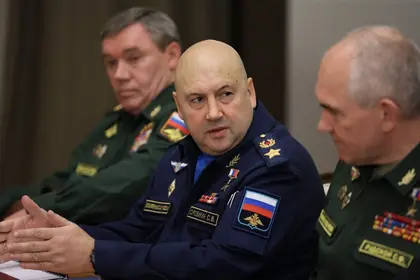Reports are appearing, in The New York Times and elsewhere, that senior Russian military officers may have known about chief of the Wagner mercenary force chief Yevgeny Prigozhin’s plans in advance and may have indicated they would support him or may have actually helped plan it.
US Intelligence agencies believe that General Sergei Surovikin, the deputy commander of Russia’s military operations in Ukraine may have supported Wagner’s move as a precursor to the removal of Russian Defense Minister Sergei Shoigu and Chief of the General Staff Valery Gerasimov.
- Access the latest Ukraine news coverage for today.
- Access the latest Ukraine news coverage for today.
JOIN US ON TELEGRAM
Follow our coverage of the war on the @Kyivpost_official.
Surovikin, who the Russian media gave the sobriquet “General Armageddon” because of his “scorched earth” tactics in Syria, was appointed head of operations in Ukraine in October.
However, shortly after taking over in November, he humiliatingly had to withdraw his troops from the southern Ukrainian city of Kherson. In January, in a sign that Putin had lost faith in Surovikin’s leadership, he was replaced by Gerasimov. Surovikin, who is also commander of the Russian Aerospace Forces supporting operations in Ukraine, remained as deputy.
Prigozhin and others, such as Igor Girkin a staunchly pro-war Russian milblogger and war criminal, made no secret of their disdain for Russia’s military leaders and blamed them for the failure of Putin’s “special military operation”. It is suspected that Surovikin shared that view, and it was suggested that, because of this, he may well have helped plan Mr. Prigozhin’s actions last weekend, an accusation that US Intelligence is said to be investigating.

US Must Address Russian Disinformation to Strengthen US Election Integrity
The New York Times reported that American intelligence officials also said there were signs that other Russian generals may have been informed of Wagner’s plans and expressed sympathy for their grievances.
They highlight the fact that the first deputy head of the Main Directorate of the General Staff of the Russian Armed Forces, Vladimir Alekseyev condemned Wagner’s rebellion, but just hours later, Prigozhin moved unopposed into the Russian city of Rostov-on-Don and Alekseyev was filmed speaking with him in the city.
Michael McFaul, a former US ambassador to Russia, said: “Think of how easy it was to take Rostov. There are armed guards everywhere in Russia, and suddenly, there’s no one around to do anything?”
Independent experts as well as US and allied officials are reported in The Times that they believe Prigozhin may have been led to believe that a large part of Russia’s army would rally to his side as he headed for Moscow. It was the fact that such support did not materialize that he turned back less than 200 kilometers from Moscow, rather than his claim that he had made his point and wanted to avoid any more bloodshed.
Analysts feel that Putin knowing, or at least suspecting, that there was some sort of conspiracy between Prigozhin, Surovikin and other generals, has decided to “sweep it under the carpet.” This may explain his acceptance of the deal that would allow the Wagner rebels, including Prigozhin, to choose exile rather than be tried for treason, as called for by most of the Kremlin and Russia’s media hawks.
Commentators feel that the fact that US leaders have largely failed to comment on the rebellion, other than to say it was an internal Russian issue, is intended to avoid reinforcing Putin’s narrative that Prigozhin was, in some way, acting on the orders or under the direction of the West.
It is the general assessment among the US and UK intelligence communities that, if Wagner’s uprising did have support or the approval of Surovikin and others, it reveals that the breakdown in the relationship between Russian generals and Putin’s top two military commanders, Gerasimov and Shoigu, was becoming ever more serious.
It is known that the Russian president doesn’t like to remove personnel that he trusts, even when they fail. That may explain why Shoigu and, more critically, Surovikin are still in post. However, if there was a link between Surovikin, Prigozhin and others and that was to be proved and become public, Putin would have no option but to act. The loss of “General Armageddon” to the occupying forces would be beneficial to Ukraine in the conduct of its war.
Stop Press
A Report has appeared on the “Ukraine” Telegram channel, quoting the Russian rosZMI media channel that Surovikin was arrested on the evening of June 27 and is detained in the Lefortovo pre-trial detention center along with his deputy, Colonel-General Andriy Yudin.
Kyiv Post was unable to verify this at this time and is investigating.
You can also highlight the text and press Ctrl + Enter






